There's a gap that's getting wider in the global climate talks taking place in Warsaw between the near unanimous pledge to keep global warming below 2C and the ability of current policies to achieve the goal.
When I say gap, I really mean a chasm. And when I say chasm, I mean a huge, gaping, canyon-like hole big enough to either eat a planet or at least lose an Earth or a carbon dioxide swamped Venus down there for a while.
The 19th United Nations Conference of Parties (COP19) meeting has just two days left to run in Poland. Some scientists yesterday delivered a sobering assessment of what was meant to be slow but definite progress.
Rather than limiting global warming to 2C - which in itself is not likely to be a painless destination - an assessment released yesterday by scientists found that current policies and pledges would deliver to the world global warming of 3.7C, but with increasing use of coal things could get worse.
Bill Hare, director of not-for-profit analysts Climate Analytics, said that with no new pledges coming from countries and with Japan and Australia reigning back their ambition, countries were "unilaterally degrading their pledges without review." He said:
These negative developments point to a concern that we could be heading into a downward spiral in policies - a downward spiral that is moving us towards a coal-dependent economy and a re-carbonisation of the world energy system that would push us to a warming of five degrees. That's a level of warming not seen on this planet for probably 55 million years and that could happen within this century.
The assessment was put together by Climate Action Tracker - a joint project of policy and energy consultants Ecofys, Climate Analytics and the Potsdam Institute for Climate Impact Research.
Hare said the fact host country Poland had organised a coal summit to coincide with the COP 19 talks had sent an "extremely negative message about where we are headed" especially given the "enormous potential" for renewable energy and increased energy efficiency to deliver cuts in emissions.
The Climate Action Tracker study noted that the International Energy Agency, which provides advice to major governments around the world, had reported that Australia's production of coal would rise by almost 50% between 2011 and 2035, with most of that coal being exported.
Hare said countries negotiating in Warsaw were "not denying" that the gap was there, but rather they were choosing to blame each other for the fact that it was there and getting bigger.
There is a lot of talk that two degrees is no longer possible, including from some in the scientific community, but that remains a political judgement about whether or not governments will ultimately have the political courage and will to move forward with those policies.
From the point of view of the scientific literature published in leading journals, the technical and economic feasibility of a two degree pathway is clear. It's a political judgement not a technical judgement.
Poland has made its own ambitions for the future clear. Yesterday the country's prime minister Donald Tusk dismissed Marcin Korolec, the environment minister, in preference for a politician who would be better able to deliver a "radical acceleration of shale gas operations" in the country. And then of course, there was the decision to host the coal conference in a country reliant on coal for its power.
According to a separate study discussed by scientists at COP19 yesterday, coal use has been booming.
In the year 1750, carbon dioxide in the atmosphere was at 277 parts per million. In 2012, it was at an average of 393 ppm, the highest it has been for at least 800,000 years. The Global Carbon Project study found coal burning added 87 ppm, with oil adding 64 ppm and gas 26 ppm.
The study, the work of more than 70 scientists and researchers from 14 countries, found some 45% of the emissions from human activity (mainly from burning fossil fuels) had been taken up by the atmosphere, with the remaining carbon dioxide being taken up equally by the oceans and land.
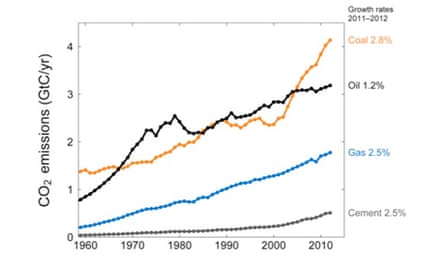
Emissions from burning coal accounted for 43% of all emissions from burning fossil fuels in 2010, with 71% of the growth in emissions coming from China. But seeing coal's fortunes on the table below, tells the story of coal's surge to the top of the fossil fuel charts.
Since the first major United Nations report into climate change was released in 1990, annual emissions of carbon dioxide from human activities have gone up by 58%.
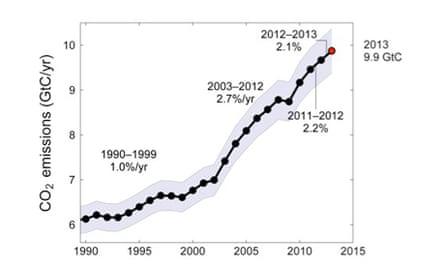
As United Nations meetings have visited places like Kyoto, Rio and Copenhagen to sign deals and talk about climate change, the real world response according to the data shows an inexorable rise. As we can see, the global financial crisis of 2007 delivered a mere wobble on a rising trajectory.
But what does global warming of around 4C mean? It was a question that came with an answer later during a presentation by Dr Alice Bows and Professor Kevin Anderson, of the Tyndall Centre for Climate Change Research at the University of Manchester.
Even at 2C, there would be widespread death of corals, flooding for millions of people, an increase in the risk of extreme weather events, stress on water supplies and more wildfires, said Dr Bows.
At an average global temperature rise of 4C, the hottest days experienced would be 6C to 12C hotter, sea levels would rise by 80 cm or higher and the yields for key crops such as maize, wheat and rice would drop by as much as 40 per cent.
"Those sorts of things would be absolutely devastating - they would be catastrophic," she said. "There's a widespread view that four degrees could be incompatible with organised global community and would inevitably lead to conflict and disruption and could potentially be beyond adaptation. Ecosystems are already being threatened - at four degrees we have irreversible impacts on ecosystems."
So what's the solution - at least in theory? The answer, according to Bows and Anderson, was to begin to impose tighter controls to deliver energy efficiency that could be done quickly while the slower process of building new low carbon power generation could happen.
Anderson, who believes carbon pricing can only play a minor role in cutting emissions, gave examples of introducing rules that would push car manufacturers to sell more fuel efficient cars and appliance companies to sell more efficient fridges that used a lot less power. The cost of moves like this, he said, were minimal but the gains were quick.
We are not short of money. We are awash with capital. But what we are short of is the courage to spend it on low carbon greening infrastructure.
Anderson also reserved criticism for the climate change negotiating community, who he said were "one of the most carbon profligate people in the world". He took a train to Warsaw from the UK.
Even though Warsaw is a "stepping stone" to a possible new global climate deal to be agreed in Paris in 2015, the steps so far seem to be backwards or sideways.
While Anderson's views might have offended some, they seem to me to be less offensive or risky than conference rooms of thousands of delegates if they're unable to agree on very much at all.
Certainly, they're less offensive than 4C of global warming.
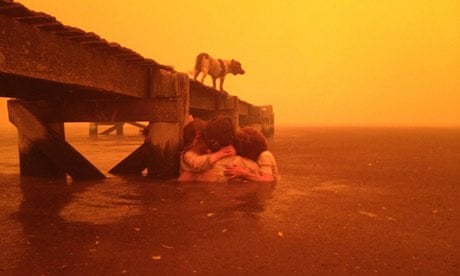
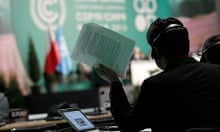



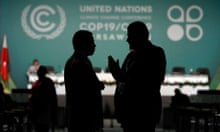
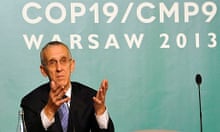
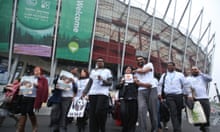
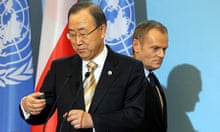
Comments (…)
Sign in or create your Guardian account to join the discussion